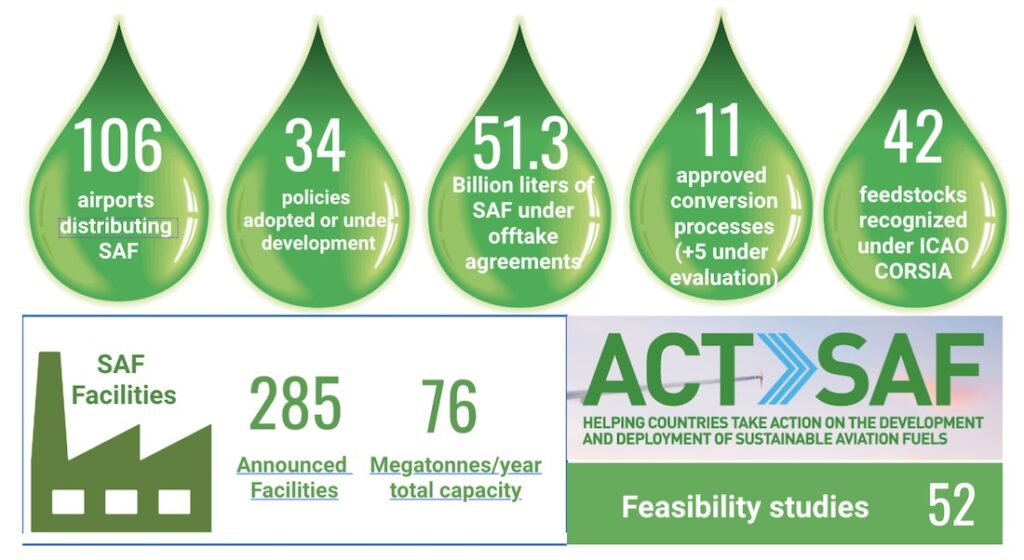Flight First-ever 100% SAF-fuelled commercial transatlantic flight marks a milestone in decarbonising air travel. this historic event is a huge step towards Jet Zero – helping people travel sustainably while creating jobs and helping economic growth.
Sustainable aviation fuels (SAF) are defined as renewable or waste-derived aviation fuels that meets sustainability criteria. Technical analysis such as ICAO shows that SAF has the greatest potential to reduce CO2 emissions from International Aviation.
Airlines are pinning their hopes on SAF, which uses waste such as cooking oils to reduce emissions by up to 70% compared to fossil fuels, to decarbonise flying before new electric and hydrogen-powered options expected in the coming decades.
Britain’s Civil Aviation Authority granted Virgin Atlantic a permit for a transatlantic flight powered only by SAF to showcase how the fuel can be used to decarbonise flying, following a technical reviews by the UK regulator, from successful ground testing of running the Rolls-Royce Trent 1000 engine that currently powers Virgin’s 787 aircraft.
The passenger jet flying from London to New York powered by 100 percent sustainable aviation fuel (SAF) took off on Tuesday with the aviation world monitoring the flighty marking the first time a commercial airline has flown the Atlantic with 100% SAF.
This remarkable event follows the successful transatlantic crossing made by a Gulfstream G600 jet using SAF last week.
Today’s flight is a major milestone towards making air travel more environmentally friendly as we move towards our goal of net zero by 2050. The historic trip is powered by SAF made from waste fats that cannot enter the food chain. Repurposing waste products into jet fuel to cut emissions provides the most immediate solution to help decarbonise our skies.

SAF has a greenhouse gas emissions reduction of around 70% when compared against standard jet fuel over its life cycle – allowing greener travel and keeping the UK connected to the world.
However SAF accounted for only 0.5% of aviation fuel in 2021, but many airlines have committed a target of 10% by 2030 and the industry’s goal of “net zero” emissions by 2050 relies on SAF accounting for 65% of fuel.
With the world about to convene in Dubai COP28 this week, today lays down a marker that the UK is already taking action when it comes to tackling the decarbonisation challenges that face the transport sector.
“Today’s historic flight, powered by 100% sustainable aviation fuel, shows how we can both decarbonise transport and enable passengers to keep flying when and where they want.”
UK Transport Secretary, Mark Harper
SAF will become an increasing part of the standard jet fuel mix, driven by an upcoming SAF mandate, with at least 10% of jet fuel being from sustainable sources in 2030. This will mean that business or leisure travellers can fly knowing their carbon footprint will be lower than ever before.
QUOTE
“The world will always assume something can’t be done, until you do it. The spirit of innovation is getting out there and trying to prove that we can do things better for everyone’s benefit.”
Sir Richard Branson, Founder, Virgin Atlantic
This landmark moment is another step towards cleaner skies after we announced the second round of the Advanced Fuels Fund on 17 November 2023. This saw 9 projects receive £53 million to help scale up the UK SAF production industry, leading the global charge towards making these fuels more readily available. Increasing the supply for operators, making it cheaper and providing reassurance for industry that the UK is the world leader in decarbonising aviation backs our commitment of having 5 SAF commercial plants to be in construction by 2025.
“We’re committed to using 10% SAF by 2030, but to get there we need the government to support the creation of a UK SAF industry”
Virgin Atlantic CEO Shai Weiss
The flight to the US will also provide the opportunity to showcase the UK’s progress in the future of transport. Promoting the UK’s work on SAF, the UK Transport Secretary will co-chair a SAF Investor Summit in New York to further unlock private investment to build a sustainable aviation sector that creates jobs in the UK and boosts the economy.
Investing in SAF is key to helping scale up the industry, similar to the International Airlines Group (IAG), which recently invested in UK SAF production company Nova Pangaea Technologies, something we aim to mimic with US investors.

